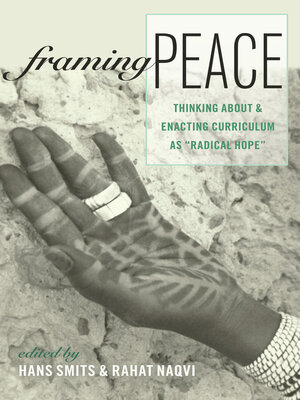Framing Peace
ebook ∣ Thinking about and Enacting Curriculum as «Radical Hope» · Complicated Conversation
By William F. Pinar

Sign up to save your library
With an OverDrive account, you can save your favorite libraries for at-a-glance information about availability. Find out more about OverDrive accounts.
Find this title in Libby, the library reading app by OverDrive.



Search for a digital library with this title
Title found at these libraries:
| Library Name | Distance |
|---|---|
| Loading... |
The language of frames suggests the need to rethink self and other in fostering ethical relationships as a foundation for peaceful existence. Educational writers and practitioners from many parts of the world, including New York, Denver, Minneapolis, South Africa, Zimbabwe, Israel, and Canada offer their perspectives on peace as an aim of curriculum.
Possibilities for learning about peace conceived in terms of Jonathan Lear's (2006) notion of «radical hope» are illustrated in the contexts of diverse settings and challenges: the aftermath of apartheid in South Africa, re-imagining post-colonial history curricula in Zimbabwe, exploring the meanings of truth and reconciliation and restorative justice in Canada, examining the quality of pedagogic relationships in elementary school classrooms, attending to experiences of gay and lesbian students in schools, experiences of marginalized students, children's experiences of civic engagement, Islamophobia in high schools and teacher education classes, fraught relationships between Palestinian and Jewish students in a teachers' college in Israel, and the inclusion of First Nations culture and knowledge in Canadian teacher education classes. As whole and in each of its parts, Framing Peace encourages us to think about peace as an urgent and fundamental responsibility of curriculum at all levels of education.
Possibilities for learning about peace conceived in terms of Jonathan Lear's (2006) notion of «radical hope» are illustrated in the contexts of diverse settings and challenges: the aftermath of apartheid in South Africa, re-imagining post-colonial history curricula in Zimbabwe, exploring the meanings of truth and reconciliation and restorative justice in Canada, examining the quality of pedagogic relationships in elementary school classrooms, attending to experiences of gay and lesbian students in schools, experiences of marginalized students, children's experiences of civic engagement, Islamophobia in high schools and teacher education classes, fraught relationships between Palestinian and Jewish students in a teachers' college in Israel, and the inclusion of First Nations culture and knowledge in Canadian teacher education classes. As whole and in each of its parts, Framing Peace encourages us to think about peace as an urgent and fundamental responsibility of curriculum at all levels of education.







